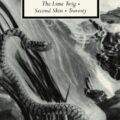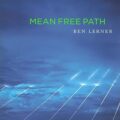Eyebrows, Cigarettes, Etcetera

Leaving the Atocha Station
by Ben Lerner
Softcover, $15.00
Coffee House Press, 2011
In Ben Lerner’s debut novel, someone is always lighting a cigarette. Awkward social situation? Time for a smoke. Waiting for a table? Cigarette, please. Terrorist attacks on Madrid’s commuter trains? Tobacco, hash, or marijuana: take your pick. If Leaving the Atocha Station were On the Road or film noir, the cigarettes would function as shorthand. A match struck between fragments of dialogue would be enough to conjure up an atmosphere of gritty expectation. For Lerner, however, smoking isn’t a brief stopover on the way to the main event — it is the main event.
In Leaving the Atocha Station, Lerner wants to replicate “the texture of et cetera,” to inhabit the white noise that accounts for the bulk of experience. Life does not coalesce around just a few Important Moments, he insists, and novels should not, either. Accordingly, Lerner creates an economy of banality, one in which momentous events are worth less than the long stretches of nothing in between. In this economy, cigarettes are not the only currency: there are also empty conversations, aimless walks, glasses of gin, and so on.
The narrator, Adam Gordon, is an American poet living in Madrid. Having won a yearlong fellowship, he is free to do the things that Americans abroad (the young, wealthy, well-educated kind) usually do. He pretends not to be a tourist. He goes to museums and gets very drunk, not necessarily in that order. He has more than one love affair. Officially, Adam is using his fellowship year to write a “long, research-driven poem” about the literary aftermath of the Spanish Civil War. Unofficially, he is conducting research of different sort, testing the absurdities of his daily experience against a poetics of hyperattention. Seen through Adam’s eyes, a cigarette in Chueca is not just a cigarette in Chueca. It is an opportunity to submit an everyday activity to compounding levels of scrutiny, to apprehend in language the dull roar of “life’s white machine.”
It is tempting to call Lerner’s novel A Portrait of the Artist as a Young Man for the Internet-addled generation — both books, after all, feature artists who are young and also men. Unlike Joyce’s Stephen, however, Adam isn’t forging anything in the smithy of his soul, and his mistrust of “sharply localized occurrences in time” means he isn’t on the hunt for epiphanies. Instead, Adam collects interpretative apparatuses: methods of seeing, ways of understanding. The real corollary is John Ashbery, who shows up on Adam’s reading list and in Lerner’s title (borrowed from The Tennis Court Oath). Lerner and his narrator admire Ashbery because his poems “allow you to attend to your attention, to experience your experience.” The result is “a strange kind of presence,” one in which you observe yourself as if from a distance.
Lerner’s first novel follows three books of poetry, including the award-winning Angle of Yaw (2006). The qualities that make Lerner’s poems so bracing — the reluctance to claim too much for language, the branching and multiplying hesitations, the suspicion of anyone who claims to speak for everyone — lose some of their freshness when set to the rhythms of prose. Whether the book dazzles or infuriates depends on how much patience you have for sentences like this one: “Maybe only my fraudulence was fraudulent.” Or this one: “Her experience of my body, I thought was more her experience of her experience of her body.” Every time we turn around, Adam is having “a profound experience of the absence of profundity.”
That’s not to say that every sentence is overburdened with paradox, and at just under 200 pages, the novel has a certain lyric compression. If there is a sluggishness on the novel’s part or an exhaustion on ours, it is because Adam has decidedly first-world poet problems, although he himself would never call them that, and the maintenance of these problems calls for ironized self-scrutiny. Get ready for a fear of fraudulence, some crippling self-doubt, and an unhealthy obsession with the linguistic niceties that divide the virtual from the actual. Occasionally, there is a welcome reprieve, and the neuroses break into a quieter register, one that gives mental illness and addiction a little space to breathe.
Much of the novel’s appeal lies in the thrill of recognition. If you have ever used enigmatic silences and sweeping half-pronouncements to cultivate an “aura of profundity,” you will nod as Adam pretends to know less Spanish than he does. (To speak haltingly, Adam imagines, is to imply that one’s thoughts are of such “insight and latent eloquence” that they can’t possibly be conveyed in a non-native language.) If you have ever suffered through a particularly uncomfortable poetry reading only to attend another the following week, you will second Adam’s declaration that, toothless as poetry is, a world without it would be reason enough to “swallow a bottle of white pills.” The danger is that Adam’s poet problems may hit a bit too close to home, in which case you will wish that Lerner had not offered such an unflinching account of what it’s like to get lost in reflexivity. As Adam circles around his anxious self-projections, Lerner doesn’t spare us the details.
Those who identify with Adam’s anxieties will become co-conspirators. Everyone else will wonder why Adam, a well-off American fresh from an Ivy League education, can’t use his superabundant self-knowledge to arrive at a wittier or more touching or more experimental version of himself. Unable to commiserate, you will be asked to console. There, there, you will be required to say, patting our narrator-cum-author on the back while he vomits onto his shoes, tells shocking lies about his mother, and loses his ability to feel pleasure at orgasm. For these readers, impatience may well set in halfway through the book. When we nourish our poets with elite educations and paid fellowships, shouldn’t they repay us by putting into words the things we dimly know but cannot say? At what point does Adam start giving back?
Lerner has planned for this contingency; Adam heads our criticism off at every pass, volunteering the worst interpretations of himself so as to preclude them. Maybe Adam is just “a goofy, drunken foreigner wanting a hug,” maybe he is “a violent, bipolar, compulsive liar,” maybe he is a “pothead” or an “alcoholic” or a “fraud.” These accusations are the book’s apotropaic magic, its garlic cloves and silver bullets. With them, Adam wards off the appearance of indulgence, and Lerner makes sure we know that his all-but-autobiographical narrative is unimpeachably aware. Adam and I may be a lot to handle, Lerner seems to say, but we can’t be any worse than we already think we are.
These anticipatory gestures have struck some readers as funny, or at least darkly comic, and they often are. Most of the time, we can imagine Ben Lerner and his narrator twin waggling their eyebrows and exhaling smoke, both in on the joke. At other times, though, there is a sneer to Lerner’s prose that suggests he is laughing at, not with, his younger self. There is an unkindness here that, drink and drugs aside, is the novel’s real excess.
Leaving the Atocha Station calls itself fiction, but it is strategically positioned between novel and memoir. On the dust jacket, Lerner’s Adam-like eyebrows jut out of his headshot, telling us all we need to know. What the eyebrows fail to communicate, the blurbs and bios helpfully fill in: anyone unfamiliar with Lerner will find out that he is “the author of three books of poetry” and a onetime “Fulbright Scholar in Spain.” Armed with this knowledge, we proceed with caution. First, a question: “This is what Lerner did with his Fulbright?” (thinking of Adam’s oval blocks of hash, “so shaped because they had been transported, wrapped in plastic, up someone’s ass”). Then, a recognition: “So this is what Lerner did with his Fulbright” (thinking of the book itself, which, to paraphrase Adam, is a translation that becomes its original as we read).
Lerner is entranced by the possibilities of the author-narrator relationship. Throughout the novel, pleasure is equated with distance — not the distance of anomie or alienation, but the distance of authorial privilege. Adam defines panic as the collapse of his “customary distance” from himself. To keep calm, he looks for himself in the sky:
In the distance airliners made their way to Barajas, lights flashing slowly on the wing, the contrails vaguely pink until it was completely dark. I imagined the passengers could see me, imagined I was a passenger that could see me looking up at myself looking down.
When he walks in the city, he surveils his own comings and goings:
I would roll one or two spliffs and put them in a pack of cigarettes, drink a glass of water, brush my teeth, walk down the stairs and out of the apartment into the plaza. I felt as I crossed the plaza that I was observing myself from the roof of my apartment; from there I could see that I was walking too fast and I’d stop, light a spliff or cigarette, then resume walking at a less frantic pace toward Puerta del Sol.
In passages like these, Lerner reminds us that the gap between writer and written, held open by time’s intervention and the absurdity of self-presentation, is impossible to close. Adam and Lerner are versions of each other, one looking down at the other looking up.
It should be obvious by now that Leaving the Atocha Station is not a book about the terrorist attacks that occurred near the Atocha train station on March 11, 2004. Though Adam is on hand to see the aftermath of the train bombings, he won’t let himself be enlisted as a witness to history. His reasons are many, but — and this is surprising — the inadequacy of language is not among them. When Adam chews over “the incommensurability of language and experience,” he doesn’t mean that it would be impossible to describe in words the atrocities of that day, the bloodied commuters streaming out of the station or the bodies strewn on the tracks. Instead, he means that because people experience moments of crisis as if they were “ready-made literature,” language has already infiltrated those moments, keeping them from feeling real. Adam doesn’t dwell on the bombings because it would have been too easy to talk about them — and because, of course, he wants to save time for everything else.
All this has the flavor of honesty, but an inauthentic aftertaste. Yes, the novel seeks out the “dilated, detached, strangely self-sufficient” patches of “no intrinsic content” that lie suspended in between life’s big events, and yes, it justifies this approach with a satisfactory, even a compelling, poetics. But Adam’s insecurities are shared by the novel. His tendency to look away whenever a moment is weighted with meaning feels defensive, especially as it seeps into the prose as a mechanism.
The cigarettes are an example. Adam admits to using smoking as a social crutch, “a prefabricated motivation and transition” that gives him an excuse to “approach or depart from a group of people or a topic.” The novel uses smoking that way, too, although it doesn’t admit it. Lerner relies on cigarettes and joints to provide necessary bathos, as in: “What was left of the light burnished what it touched; Isabel was half shadow and half bronze, boundless and bounded. We got high.” Perhaps it’s characterization via flowering prose: Adam is supposed to be a writer still in his fledgling phase, the phase in which words like “burnished” and “touched” somehow end up in the same sentence. Yet in these repeated returns to the “et cetera,” Leaving the Atocha Station seems more a novel trying not to embarrass itself than a novel consumed by its premises. Lerner’s poems, in contrast, are less inhibited, and have weirder, wider-ranging concerns.





